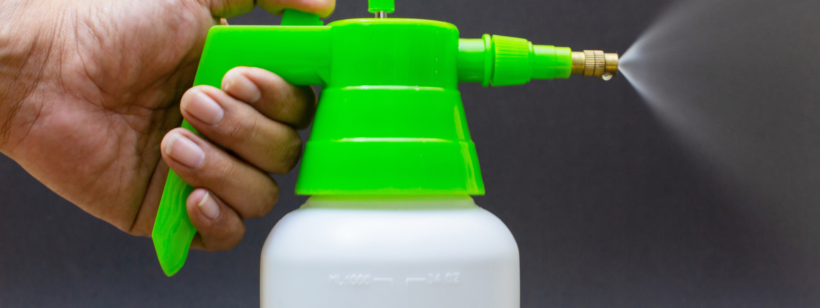Pressure washing your roof, deck, or any other part of your home helps remove dirt, grime, and other substances quickly and effectively. When you pair these pressurized blasts with chemical-based cleaning solutions, the effectiveness of your cleaning will only increase. In this blog post, we’ll take a look at some tips and tricks for using pressure washing chemicals that you can implement during your next cleaning.
What is Pressure Washing?
Pressure or power washing is the process of cleaning certain surfaces by using a high-pressure water spray. Sometimes paired with a cleaning solution, this process can remove several substances from a variety of surfaces such as brick, stone, and vinyl siding. Here are a few of the most common substances pressure washers can blast away:
- Paint
- Mold
- Grime
- Dust
- Dirt
- Tar
Tip #1: Which Pressure Washing Chemicals Should You Use?
There are many different types of chemicals that you are able to use when power or pressure washing. The surplus of options may seem overwhelming, but each chemical serves a different purpose when it comes to cleaning. Some can’t be used on certain substances, while others can only remove certain types of debris. So, once you identify which surface you’re trying to clean, the list of chemicals you can choose from will decrease.
Some common chemicals and their uses include:
- Oxalic acid — Removes rust
- Citric acid — Removes stains from wooden decks and concrete
- Sodium hypochlorite — Disinfects surfaces and removes stains
- Sodium hydroxide — Degreases glass and steel
- Bleach — Sanitizes, disinfects, and is useful for fighting molds
- Ammonia — Cleans stainless steel and glass surfaces
Tip #2: Soap vs. Detergent
While soaps and detergents may seem like they’re the same thing, they actually aren’t!
Soap is naturally derived and is made from fats and oils of plant and animal products. These oils and fats are combined with salts to create soap. Detergents, on the other hand, are entirely man-made with some organic and inorganic chemicals.
Soaps have been seen as more environmentally friendly, as they tend to be naturally occurring. Most can be washed away into lawns or storm drains without worry—they will simply biodegrade! Detergents are a bit trickier and tend to require proper disposal methods to ensure that the chemicals don’t harm the environment. You need to use caution when using detergents to ensure that you are disposing of them properly.
Tip #3: Safety Measures
When power washing, it is important to take safety precautions. When working with a pressure washer and chemicals, make sure to wear the following safety gear:
- Gloves — avoid direct contact with the chemicals
- Glasses — help protect against high-pressurized blasts, debris, and chemicals
- Mask — if the chemicals you use are dangerous, then make sure to wear a mask with proper ventilation to decrease exposure to the chemicals
- Boots — avoid wearing open-toed shoes when using chemicals
Always follow the directions listed on the detergent package to decrease the chance of damage to you or the surrounding environment.
Tip #4: Know When to Ask for Help
Even though homeowners are perfectly capable of pressure or power washing their roof, deck, or other parts of their home, they don’t always know the best way to clean their specific surfaces.
If this is the case for you, then it wouldn’t hurt to hire a professional cleaner who knows the best techniques to clean your surface without damaging it in the process. Professional cleaners also use specially formulated, industrial-grade solutions that will effectively remove mold, grime, and other substances from your surface better than at-home solutions can.
Have Questions About Pressure Washing Chemicals?
TidalWashers provides our customers with commercial-grade pressure washing solutions. Visit our shop or reach out to us today to learn more about our eco-friendly and effective products!

